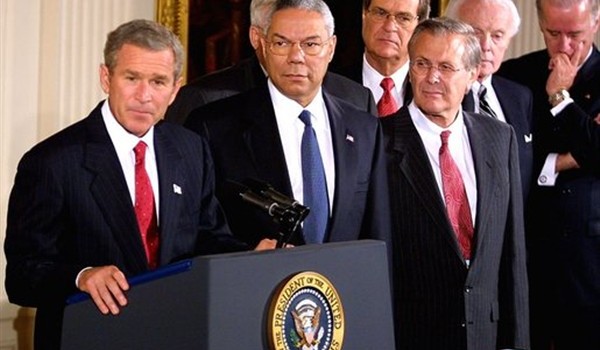Paul Pillar: Still Peddling Iraq War Myths, Ten Years Later
We continue our week long feature on the tenth anniversary of the U.S. invasion of Iraq with a look at a recent essay by Paul Pillar, author of Intelligence and U.S. Foreign Policy: Iraq, 9/11, and Misguided Reform.
In the essay Still Peddling Iraq War Myths, Ten Years Later, published on Pillar’s excellent blog for The National Interest, argues that:
[T]he anniversary retrospectives also give renewed exposure to those who promoted the war and have a large stake in still promoting the idea that they were not responsible for foisting on the nation an expedition that was so hugely damaging to American interests.
Pillar’s article was in part inspired by a recent event he participated in with former Bush administration figures the then-deputy national security adviser Stephen Hadley and Douglas Feith, who as an undersecretary of defense was one of the most rabid supporters of the invasion of Iraq. Still maintaining that the war needed to be fought to protect the United States, Hadley and Feith suggest that if any mistake was made in deciding to go to war it was following bad intelligence. The lesson to learn is that administrations need to ask tougher questions about intelligence.
As Pillar shows, in what amounts to a devastating critique of the fallacy of Hadley and Feith’s position, bad intelligence had little to do with the Bush administration’s choice to go to invade Iraq. Bush and his neoconservative advisers wanted to get rid of Saddam and saw the post 9-11 atmosphere as giving them an opening. The administration backed intelligence when it supported their case (as with WMD’s) and discredited it when it challenged it (as with the lack of a connection between Saddam and al-Qaeda).
Pillar concludes by writing:
If one wants to learn valid lessons from what happened ten years ago, the process back then was so pathological that many specific lessons about what to avoid in the future could be extracted. Many of those lessons could be subsumed into one observation: extraordinary as it may seem, there was no policy process at all—no options paper, no meeting in the White House situation room or anything else—that addressed whether going to war against Iraq was a good idea. So it was not only the intelligence community but also other sources of information and insight, inside and outside government, that were shut out from having any impact on the decision to launch the war.
Hadley denied this observation, too, muttering something about needing to keep things close-hold so as not to jeopardize the “diplomatic process.” That just raises another myth—that the administration was trying to solve a problem through diplomacy before resorting to force—that also is belied by a substantial record, leading up to the final days in which the United States kicked international arms inspectors out of Iraq and in effect said “never mind that we didn’t get another UN resolution, we’re going to war anyway.” What pretended to be interest in diplomacy was a charade intended mainly to placate Powell and the British.



